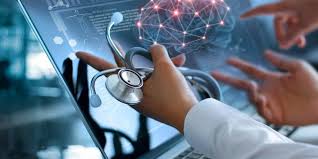Advertisements
The technological revolution that is transforming the healthcare sector is a reality that has directly impacted the quality of life of people around the world. From the integration of artificial intelligence in diagnostics to the use of wearables for real-time health monitoring, technology is redefining the way we understand and care for health. This promising scenario opens a new chapter where significant advances not only improve medical services, but also promote a culture of prevention and continuous well-being.
The digitalization of health data, for example, has enabled faster storage and access to essential information, facilitating more accurate diagnoses and personalized treatments. Electronic health records and telemedicine are just some of the innovations that are making care more efficient and accessible. This transformation is accompanied by the development of mobile applications that encourage healthy habits, as well as devices that monitor vital signs, increasing the active participation of individuals in managing their own health.
Advertisements
Another aspect of this revolution is the application of big data and machine learning to predict disease outbreaks and respond more effectively to medical emergencies. The analysis of large volumes of data has made it possible to identify patterns that previously went unnoticed, enabling a proactive approach to combating epidemics and formulating public health policies. With these tools, the future of medicine looks more promising, with rapid and assertive responses that can save lives.
Furthermore, technological innovations are promoting unprecedented integration between different areas of healthcare, from pharmaceuticals to biotechnology, culminating in advances such as precision medicine and gene therapies. This convergence is paving the way for increasingly effective and less invasive treatments, shaping a new era where technology is not just a tool, but a powerful ally in the search for a healthier and longer life. 🌟
Advertisements

The Integration of Artificial Intelligence in Medicine
Artificial intelligence (AI) has been a game-changer in healthcare, bringing advances that are revolutionizing the way care is delivered. AI enables faster, more accurate diagnoses, helping healthcare professionals make more informed decisions. AI’s ability to analyze vast amounts of data in seconds is transforming the way we understand diseases and their progression.
One notable example is the use of AI in imaging tests such as mammograms and CT scans. With advanced algorithms, AI can identify abnormalities with greater accuracy than many human experts. This not only increases the rate of early detection of diseases but also reduces the number of false positives, easing patient anxiety.
Additionally, AI is being used to personalize treatment plans. Based on patients’ genetic data and medical histories, AI can suggest therapies that are most effective for specific individuals, increasing the chances of success and reducing side effects. This personalized approach is paving the way for more effective, patient-centered medicine.
Telemedicine: Access to Healthcare Anywhere
Telemedicine has become a crucial solution for expanding access to healthcare, especially in remote areas or for people with limited mobility. With the advancement of communication technologies, patients can now consult doctors and specialists from anywhere in the world, without having to leave their homes.
This form of care is particularly useful for chronic disease management, where continuous monitoring is essential. Connected devices allow health data to be sent directly to professionals, who can assess the patient’s condition and adjust treatments as needed.
Recommended Articles
Additionally, telemedicine offers a practical and efficient solution to mental health issues. Online therapies and virtual consultations with psychologists and psychiatrists have become more accessible, allowing more people to seek help without the stigma associated with in-person visits. This flexibility is vital to promoting mental health and emotional well-being.
The Wearable Device Revolution in Health Monitoring
Wearable devices such as smartwatches and fitness trackers are becoming increasingly popular as health monitoring tools. Equipped with sensors that track everything from daily steps to heart rate and sleep patterns, these devices offer valuable insights into users’ well-being.
The ability to constantly monitor vital signs and physical activity allows individuals to take a more active role in managing their health. Information collected by these devices can be shared with healthcare professionals, who can use it to provide personalized recommendations and early interventions.
These devices also play a crucial role in promoting healthy habits. Associated apps encourage users to stay active, drink more water, and sleep better. With gamified challenges and rewards, wearables transform health care into a motivating and interactive experience. ⌚️
3D Printing: Personalization and Innovation in Medicine
3D printing has brought a new dimension to personalization in medicine. This technology allows the creation of personalized prosthetics, orthoses and even implants, adapted to the anatomical specificities of each patient. This not only improves comfort, but also the effectiveness of the devices.
Additionally, 3D printing is revolutionizing the production of tissues and organs. Researchers are working on biological printers that use living cells as “ink” to create organ-like structures. Although still in the experimental stages, this technology promises to solve the shortage of organs for transplant in the future.
The accessibility and reduced cost of 3D printers also allow hospitals and clinics to produce many of the medical devices they need in-house, reducing wait times for patients and reducing overall production costs. This advancement is democratizing access to high-quality healthcare.
Big Data: Transforming Data into Clinical Decisions
The growing volume of data generated daily in the healthcare sector has the potential to revolutionize patient care. Big Data involves processing and analyzing large data sets to extract useful information that can improve clinical decision-making.
By integrating big data, healthcare systems can identify disease patterns, predict outbreaks, and even personalize patient care based on population trends. Data collected from different sources, such as electronic health records, wearable sensors, and health apps, forms a comprehensive picture of a population’s health status.
Analyzing this data helps professionals better understand how social, economic, and environmental factors affect health. With this information, health care can be tailored to meet the specific needs of each community, promoting a more equitable and effective health system.
Final Considerations on Digital Transformation in Healthcare
- Digital transformation is promoting more precise and personalized medicine.
- Telemedicine and wearable devices are democratizing access to healthcare.
- 3D printing and Big Data are driving innovations that improve patients’ quality of life.
- Adopting these technologies requires an ethical and patient-focused approach to ensure long-term benefits.
Conclusion
The technological revolution in healthcare is redefining the way we view well-being and healthcare. Through innovations such as telemedicine, artificial intelligence and wearables, we are experiencing an unprecedented moment in which technology is joining forces with medicine to create more accessible and efficient solutions. First, telemedicine has democratized access to healthcare, especially in remote areas, thereby reducing health inequalities. Additionally, artificial intelligence is playing a crucial role in analyzing large volumes of data, enabling more accurate diagnoses and personalized treatments.
Furthermore, wearable devices offer users the ability to monitor their health in real time, encouraging healthier lifestyles and preventing chronic diseases. These advances not only improve patients’ quality of life, but also enhance the work of healthcare professionals, making processes more agile and effective. However, it is vital that the sector continues to evolve ethically, ensuring the security and privacy of patient data. In short, the integration of technology into healthcare is not just a passing trend, but a necessary transformation for a healthier and more sustainable future for all. 💡




